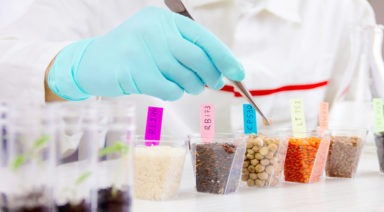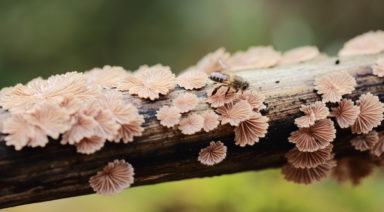Biotech Company To Send Woman to Space to Birth First E.T. Baby

There’s a long list of activities expecting mothers are typically told to avoid and often they’re pretty mundane; prolonged physical activity, amusement park rides, and getting a tattoo. Not included on this list – because any sane human would consider it to be pretty much implied – is space flight. But now a biotech company called SpaceLife Origin, wants one lucky lady to cast those overly cautious maternal instincts aside and take a trip into the exosphere, so she can give birth to the first (technically) extraterrestrial child.
SpaceLife Origin is founded on the premise that humans are getting close to colonizing other planets and that Earth is becoming an increasingly hostile environment, due to climate change and other unnamed threats. Accordingly, its founders set up a series of missions that involve launching the precursors of life into space over the next few years, and eventually launching a pregnant woman into space to give birth by 2024.
Their first launch, planned for 2020 and titled Mission Ark, is being marketed as mankind’s ultimate insurance policy, offering individuals the ability to store their “Seeds-of-Life” in a satellite hovering in low-earth orbit for the next several decades. Those with the means to afford it can buy themselves piece of mind, knowing their potential progeny will be stored safely off-planet, impervious to any anthropogenic or natural disasters down here amongst us plebeians.
Their second project, set to launch in 2021 and titled Mission Lotus, involves the first attempt to conceive a human being in space – though not by traditional means. Human egg and sperm cells will be launched up to a space station, where they will be used to artificially create an embryo that will mature for a few days, before being returned to Earth, where gestation will continue inside the mother. Nine months later, she will give birth to the first child conceived off planet.
Finally, Mission Cradle hopes to enact the first birth of a human being in space, technically creating the first “extraterrestrial” baby ever. But how would they get a pregnant woman into space without the G-forces, radiation, and other extreme conditions affecting her unborn child? And what about the trip back? All great questions.
SpaceLife says it’s possible though, and that it’s necessary for us to learn the technical aspects of this process if we ever want to colonize distant planets.
“It’s a small step for a baby, but a giant baby-step for mankind,” said Dr. Egbert Edelbroek, SpaceLife Origins Chief Strategy & Innovation Officer.
It’s hard to tell if the company has achieved the necessary funding, partnerships with space agencies, or humans willing to donate their seeds, but if we had to guess, the latter part of that equation is likely the easiest box to check.
SpaceLife’s website includes a promotional video that shows the evolution of mankind’s achievements in a quick montage of stock images, followed by a video of Elon Musk speaking at a SpaceX event. It’s unclear whether the company is actually in talks with Musk, but it’s obvious they’re at least trying to give him a nudge to recognize their lofty plan.
Unsurprisingly, the tentative space nation Asgardia, has expressed its support of SpaceLife’s plan, as it too, hopes to pioneer a number of firsts in space, including a space station that would support an entire nation. But as idealistic and romantic as this all sounds, it always leads one to wonder whether these futurists have the interests of the people in mind, or whether they’re only considering the upper echelon of society.
For more on the potential existence of an elite plan to covertly colonize our solar system, watch this episode of Deep Space:
Should We Be Hesitant to Embrace Transhumanism?

The human body has somewhere in the vicinity of 50 to 100 trillion cells, depending on who you ask. Each of these cells has .07 volts of electrical energy potential — a relatively small number you might say. But when you multiply those .07 volts times 50 to 100 trillion, you get somewhere between two and a half, to five trillion volts. We are powerhouses of electrical energy potential.
Yet for some, this potential isn’t enough. In the minds of transhumanists, the body is a work in progress — one in which we must actively improve toward some perceived ideal. In some circumstances they may be right; our bodies are not all created equally, some face deformities and defects, or aren’t built as sturdy as others, making a good argument for the need to artificially augment.
But according to researcher and author Gregg Braden, this is a slippery slope — one in which we must tread with caution while appreciating the truly high-tech construction of the biological suits we’ve found ourselves born into.
“All of the technology that is now being developed in the world around us, and I worked in the Cold War years in the defense industry, space-based lasers, ‘Star Wars’ Defense Initiative… and I have yet to this moment, seen any tech in the world around us that does not mimic what we already do in our cells, except our cells do it better,” Braden said in a recent interview with Regina Meredith on Open Minds.
With advancements in microchip technology, futurists envision a world in which we begin to work toward almost complete integration with technology and computers. Some even go so far as to believe we will one day be capable of transferring our consciousness onto a hard drive composed of microscopic silicon chips, experiencing the world through that mechanistic, binary scope of the computer — potentially allowing humans to achieve something that looks like immortality.
But this reductionist mindset of the materialist, scientific lens is incredibly arrogant, Braden said.
Firstly, science’s “hard problem of consciousness” currently limits it from understanding what exactly consciousness is and where it comes from. And secondly, would this really even be the same kind of consciousness? Can you separate consciousness from our biological nature? And if you could, why would you?
Those are the two trains of thought when it comes to the views of our advancing technology and the transhumanist movement, Braden said.
One side views it as, “If we were never supposed to learn how to achieve such a feat, why have we gotten this far?”
While the other side says, “Just because we can, doesn’t mean we should.”




































